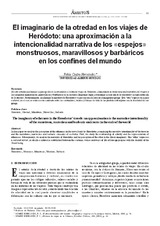El imaginario de la otredad en los viajes de Heródoto: una aproximación a la intencionalidad narrativa de los «espejos» monstruosos, maravillosos y barbáricos en los confines del mundo
The imaginary of otherness in the Herodotus’ travels: an approximation to the narrative intentionality of the monstrous, marvelous and barbaric «mirrors» in the ends of the world
Autor
Castro Hernández, Pablo
Editor
Asociación de Estudios de Ciencias Sociales y HumanidadesFecha
2018Materia
HeródotoOtredad
Monstruos
Maravillas
Barbarie
Herodotus
Otherness
Monstruos
Wonders
Barbaric
METS:
Mostrar el registro METSPREMIS:
Mostrar el registro PREMISMetadatos
Mostrar el registro completo del ítemResumen
En este estudio analizamos la percepción de la otredad en el relato de viajes de Heródoto, examinando la intencionalidad narrativa del viajero y
los elementos monstruosos, maravillosos y barbáricos de la eschatía. En primer lugar, estudiamos la relación de la alteridad y la representación
de la otredad. Posteriormente, analizamos la narrativa de Heródoto y su percepción del otro en el imaginario griego. Este ‘otro’ expresa un espejo
cultural, en el cual se establece un contraste entre las costumbres, valores y formas de vida de los pueblos extranjeros con la identidad del ser
griego. In this paper we analyze the perception of the otherness in the travel book by Herodotus, examining the narrative intentionality of the traveler
and the monstrous, marvelous and barbaric elements of eschatia. First, we study the relationship of alterity and the representation of
otherness. Subsequently, we analyze the narrative of Herodotus and his perception of the other in the Greek imaginary. This ‘other’ expresses
a cultural mirror, in which a contrast is established between the customs, values and ways of life of foreign peoples with the identity of the
Greek being.

